- Human population has grown exponentially.
- Words are 2D signals that can convey information about the 4D world.
This post is written in Scroll, a 2D language.
I have a new language, a 4D one, I've been working on for over a year now. I call it Ford (get it?).
I don't have much to share yet but I wanted to write about it anyway. Maybe someone is working on a similar thing and would like to collaborate.
Continue reading...I believe learning through motion-through conducting physical experiments in the real world-is vastly superior to learning through reading.
But the number of experiments one can do is vast, with some being far more informative than others, and time and resources are limited. Reading can point one to the motions-the experiments-that are most informative.
Thus, the most valuable symbols are the ones that guide one to conduct the most useful experiments.
Lately I've been figuring out how to put all of science into one file. I think the file would largely be experiment after experiment after experiment. Each one, the near minimum number of symbols to communicate the easiest experiment that can be done to cause learning the next most useful set of patterns about the world.
Continue reading...Pretext is all the words, all the definitions, all the patterns not in the text but that the text depends on. The texts that the author possesses and the reader requires.
Continue reading...What Science May Be
by Breck Yunits
We can embody all of science into a single fully connected text file.
Continue reading...Do you want to learn a new way to think? And a new way to write? Do you want to learn how to look at everything from a new perspective?
If so, read on.
I will try to explain to you how to "think in Parsers". I'll also then go into "writing with Parsers", a computer language we've made. It might not click immediately, but when it finally does I think you'll find it wonderfully useful.
No matter what topic you want to learn, from music to math, chemistry to carpentry, mechanics to quantum mechanics, thinking in parsers gives you another path to understanding any domain.
Continue reading...The below is a chapter from a short book I am working on. Feedback appreciated
Continue reading...Introduction
I sit with my coffee and wonder, can I explain the general pattern of Mathematics on a single page?
My gut says yes, my brain says maybe, and so I shall give it a go.
Mathematics, the written language
I aim to explain the essential concepts of the Mathematics humans write on rectangular surfaces. In other words, I'm limiting my scope to talk about 2D written mathematics only. Even math implented as computer programs (Mathematica, for example) is out of scope, as I've already examined thosein earlier work.
My claims are limited to that scope, though you may find these concepts useful beyond this.
Cheating, a bit
I need to admit that although this essay shall not exceed a page (including illustrations), I am undercounting the length of my explanation of Mathematics because I am ignoring the considerable requirements the reader must have developed to be able to parse English.
Continue reading...What does it mean to define a language?
It means to write down a set of restrictions.
Languages let you do things by defining what you can't do.
Languages narrow your choices. You can still take your reader to a land far far away; you just need to take them in practical steps.
Communication requires constraints.
Too few restrictions and someone can write anything, yet communicate nothing.
Continue reading...We're building a new blockchain (L1).
This chain will leapfrog all others on trust and speed.
We will be misunderstood, ignored, and mocked.
And then, our math will win.
-Breck
Continue reading...Alejandro writes of an exercise to describe something in two words.
To him Scroll is "semantic blogging".
His Scroll blog is "a database of [his] knowledge."
He then asks what two words I would use for Scroll?
Continue reading...Everything I own is in the overhead bin.
This is cool if you are 20.
But I am 40. I have two kids.
At 40 this is a bit extreme.
Continue reading...by Breck Yunits
All jobs done by large monolithic software programs can be done better by a collection of small microprograms (mostly 1 line long) working together.
Continue reading...Trust, and understand.
by Breck Yunits
Is there a better way to build a blockchain? Yes.
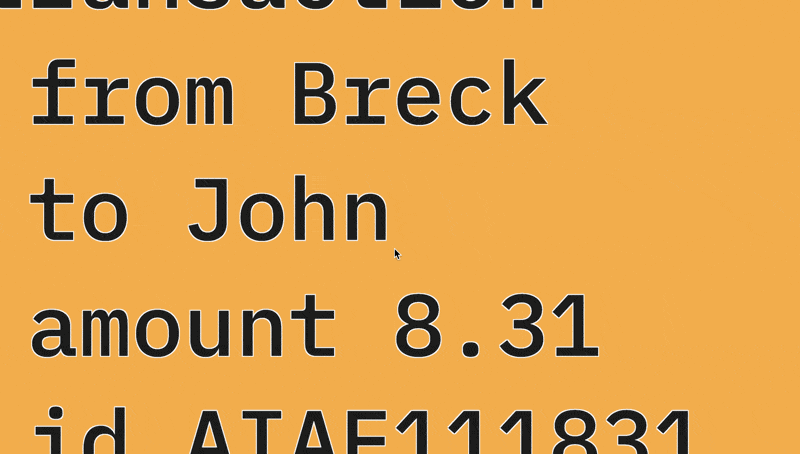
A Particle Chain is a single plain text document of particles encoded in Particle Syntax with new transactions at the top of the document and an ID generated from the hash of the previous transaction.
Particle Chain is a syntax-free storage format for the base layer of a blockchain to increase trust among non-expert users without sacrificing one iota of capabilities. A Particle Chain can be grokked by >10x as many people, thus leading to an order of magnitude increase in trust and developers on a chain.Continue reading...
Are some intellectual environments better than others? Yes.
ETA! states that E, the evolution time of ideas, is the time T needed to test alterations of ideas, divided by the factorial of the number of ideas in the Assembly Pool A!.
Longer evolution times means worse ideas last longer before evolving into better ideas.
Continue reading...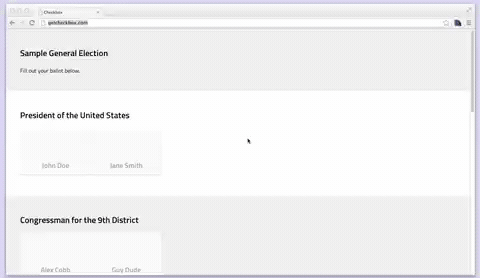
Our beta from 2013.
June 25, 2024 — In 2013 my friends and I won the Liberty Hackathon in San Francisco.
Continue reading...
June 12, 2024 — After years of development, I'm looking for beta testers for The World Wide Scroll (WWS).
Continue reading...Websites don't need web servers.
June 11, 2024 — You can now download this entire blog as a zip file for offline use.
The zip file includes the Scroll source code for every post; the generated HTML; all images; CSS; Javascript; even clientside search.
Instructions
- Download
- Unzip
- Open
index.html
Can we quantify intelligence? Yes.
Program P is a bit vector that can make a bit vector (Predictions) that attempts to predict a bit vector of actual measurements (Nature).
Coverage(P) is the sum of the XNOR of the Predictions vector with the Nature vector.
Intelligence(P) is equal to Coverage(P) divided by Size(P).
Continue reading...by Breck Yunits
May 31, 2024 — Yesterday, on a plane, I found an equation I sought for a decade.
Patch is a tiny Javascript class (1k compressed) with zero dependencies that makes pretty deep links easy.
Continue reading...Analyzing the version numbers of 621 programming languages
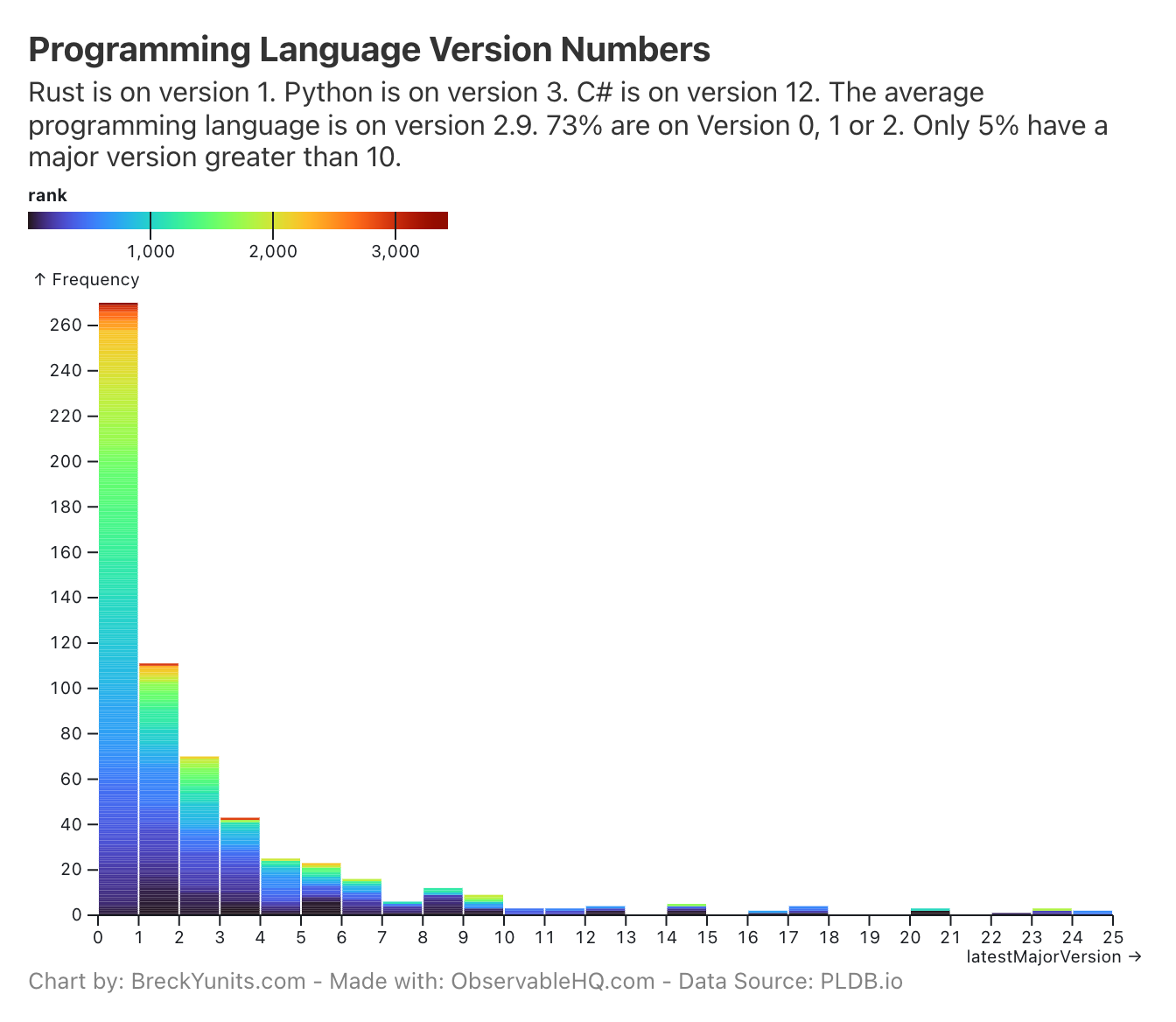
May 25, 2024 — I just pushed version 93.0.0 of my language Scroll. Version 93!
Continue reading...by Breck Yunits
All tabular knowledge can be stored in a single long plain text file.
The only syntax characters needed are spaces and newlines.
This has many advantages over existing binary storage formats.
Using the method below, a very long scroll could be made containing all tabular scientific knowledge in a computable form.
Continue reading...Datasets are automated tests for world models
by Breck Yunits
April 23, 2024 — I wrapped my fingers around the white ceramic mug in the cold air. I felt the warmth on my hands. The caramel colored surface released snakes of steam. I brought the cup to my lips and took a slow sip of the coffee bean flavored water inside.
Happiness is a hot cup of coffee in a ceramic mug on a cold day.
Continue reading...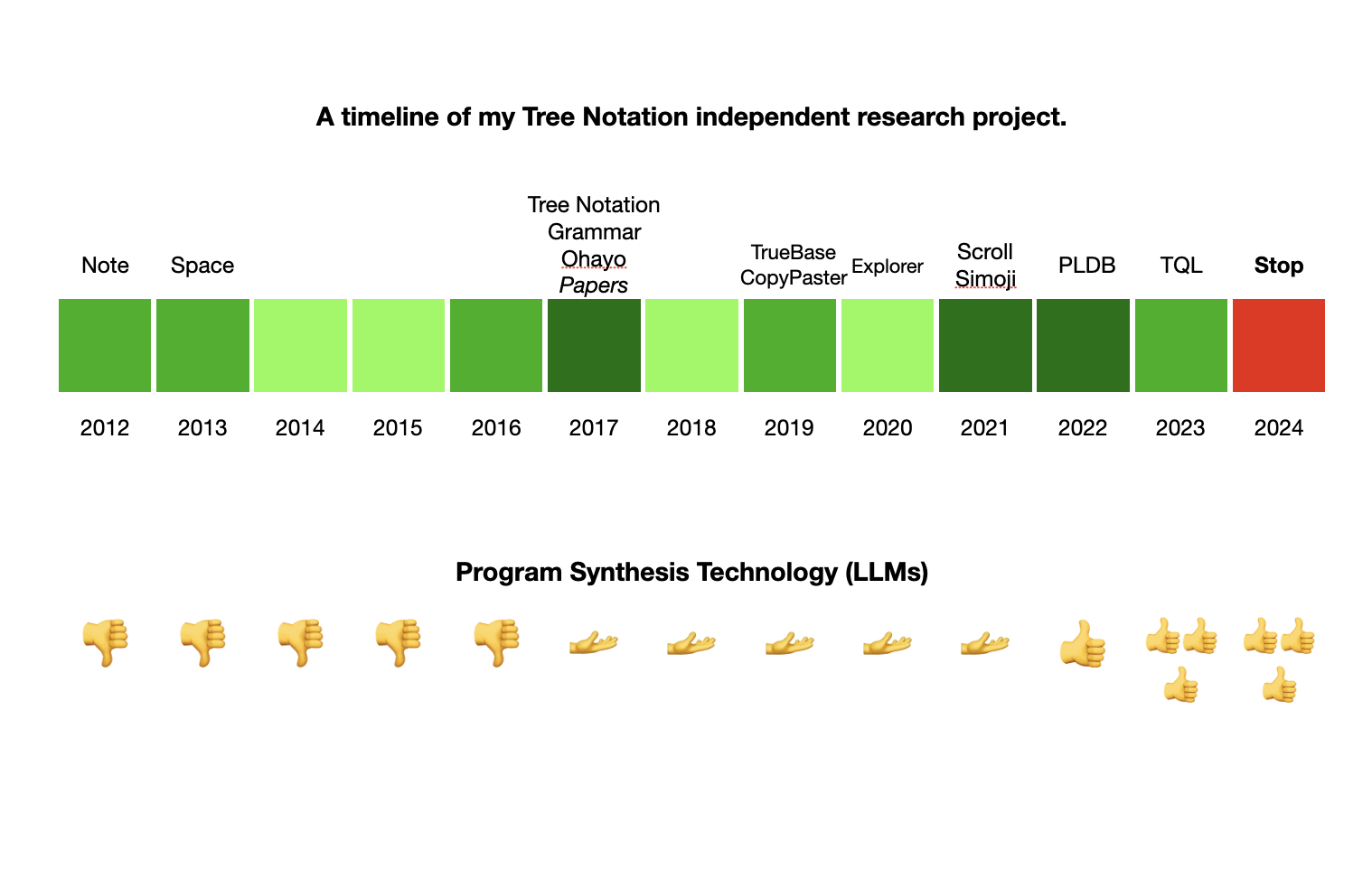
April 2, 2024 — It has been over 3 years since I published the 2019 Tree Notation "Annual" Report. An update is long overdue. This is the second and last report as I am officially concluding the Tree Notation project.
I am deeply grateful to everyone who explored this idea with me. I believe it was worth exploring. Sometimes you think you may have discovered a new continent but it turns out to be just a small, mildly interesting island.
Continue reading...January 12, 2024 — For decades I had a bet that worked in good times and bad: time you invest in word skills easily pays for itself via increased value you can provide to society. If the tide went out for me I'd pick up a book on a new programming language so that when the tide came back in I'd be better equipped to contribute more. I also thought that the more society invested in words, the better off society would be. New words and word techniques from scientific research helped us invent new technology and cure disease. Improvements in words led to better legal and commerce and diplomatic systems that led to more justice and prosperity for more people. My read on history is that it was words that led to the start of civilization, words were our present, and words were our future. Words were the safe bet.
Continue reading...December 28, 2023 — I thought we could build AI experts by hand. I bet everything I had to make that happen. I placed my bet in the summer of 2022. Right before the launch of the Transformer AIs that changed everything. Was I wrong? Almost certainly. Did I lose everything? Yes. Did I do the right thing? I'm not sure. I'm writing this to try and figure that out.
Continue reading...June 16, 2023 — Here is an idea for a simple infrastructure to power all government forms, all over the world. This system would work now, would have worked thousands of years ago, and could work thousands of years in the future.
Continue reading...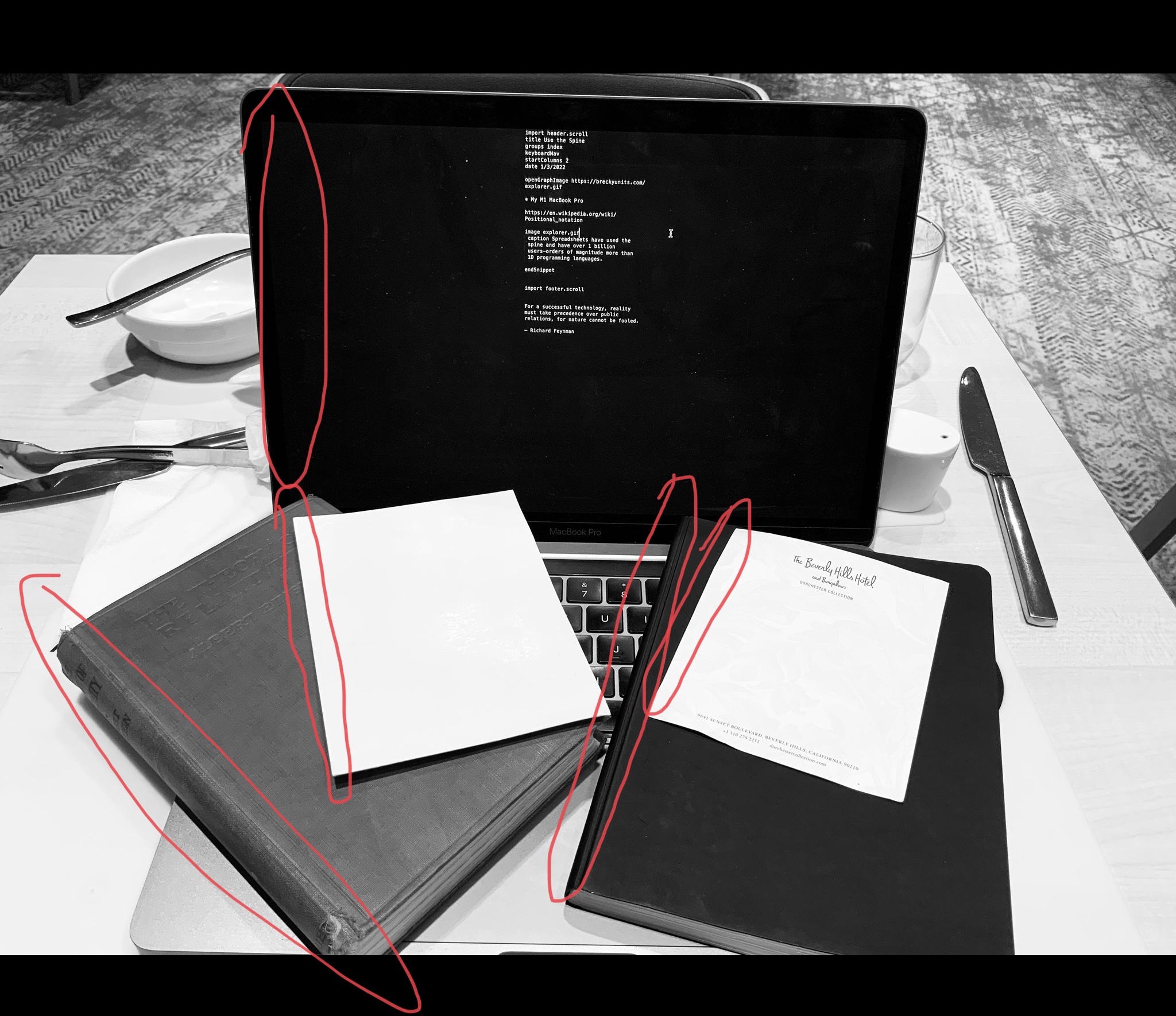
My M1 MacBook screen, paper notebook, notepads, and my 1920 copy of Einstein's Theory of Relativity, all have spines.
January 3, 2023 — Greater than 99% of the time symbols are read and written on surfaces with spines.
You cannot get away from this.
Yet still, amongst programming language designers there exists some sort of "spine blindness".
They overlook the fact that no matter how perfect their language, it will always be read and written by humans on surfaces with spines, as surely as the sun rises.
Why they would fight this and not embrace this is beyond me.
Nature provides, man ignores.
Continue reading...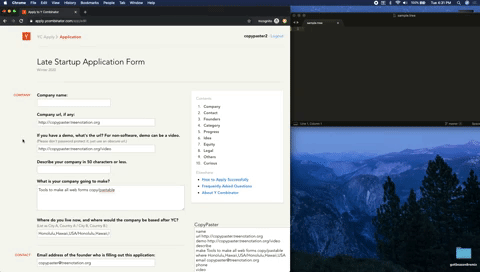
Every single web form on earth can (and will) be represented in a single textarea as plain text with no visible syntax using Particle Syntax. Traditional forms can still be used as a secondary view. In this demo gif we see someone switching between one textarea and a traditional form to fill out an application to YCombinator. As this pattern catches on, the network effects will take over and conducting business on the web will become far faster and more user friendly (web 4.0?).
9/5/2024: This is now live in Scroll! You can start using it now!
December 30, 2022 — Forget all the "best practices" you've learned about web forms.
Everyone is doing it wrong.
The true best practice is this: every web form on earth can and will be replaced by a single textarea.
Current form technology will become "classic forms" and can still be used as a fallback.
Continue reading...November 16, 2022 — I dislike the term first principles thinking. It's vaguer than it needs to be. I present an alternate term: root thinking. It is shorter, more accurate, and contains a visual:
Sometimes we get something wrong near the root which limits our late stage growth. To reach new heights, we have to backtrack and build up from a different point.
An alternative to inline markup
December 15, 2021 — Both HTML and Markdown mix content with markup:
A link in HTML looks like <a href="hi.html">this</a>A link in Markdown looks like [this](hi.html).chat
hey. I just added Dialogues to Scrolldown.
cool. But what's Scrolldown?
Scrolldown is a new alternative to Markdown that is easier to extend.
how is it easier to extend?
because it's a tree language and tree languages are highly composable. for example, adding dialogues was a simple append of 11 lines of parser code and 16 lines of CSS.
okay, how do I use this new feature?
the source is below!Continue reading...February 28, 2021 — I thought it unlikely that I'd actually cofound another startup, but here we are. Sometimes you gotta do what you gotta do.
We are starting the Public Domain Publishing Company. The name should be largely self-explanatory.
If I had to bet, I'd say I'll probably be actively working on this for a while. But there's a chance I go on sabbatical quick.
The team is coming together. Check out the homepage for a list of open positions.
Continue reading...February 22, 2021 — Today I'm launching the beta of something new called Scroll.
Continue reading...December 9, 2020 — Note: I wrote this early draft in February 2020, but COVID-19 happened and somehow 11 months went by before I found this draft again. I am publishing it now as it was then, without adding the visuals I had planned but never got to, or making any major edits. This way it will be very easy to have next year's report be the best one yet, which will also include exciting developments in things like non-linear parsing and "forests".
In 2017 I wrote a post about a half-baked idea I named Tree Notation.
Since then, thanks to the help of a lot of people who have provided feedback, criticism and guidance, a lot of progress has been made flushing out the idea. I thought it might be helpful to provide an annual report on the status of the research until, as I stated in my earlier post, I "have data definitively showing that Tree Notation is useful, or alternatively, to explain why it is sub-optimal and why we need more complex syntax."
Continue reading...January 29, 2020 — In this long post I'm going to do a stupid thing and see what happens. Specifically I'm going to create 6.5 million files in a single folder and try to use Git and Sublime and other tools with that folder. All to explore this new thing I'm working on.
TreeBase is a new system I am working on for long-term, strongly-typed collaborative knowledge bases. The design of TreeBase is dumb. It's just a folder with a bunch of files encoded with Tree Notation. A row in a normal SQL table in TreeBase is roughly equivalent to a file. The filenames serve as IDs. Instead of each using an optimized binary storage format it just uses plain text like UTF-8. Field names are stored alongside the values in every file. Instead of starting with a schema you can just start adding files and evolve your schema and types as you go.
Continue reading...January 23, 2020 — People make biased claims all the time. A decent response used to be "citation needed". But we should demand more. Anytime someone makes a claim that seems biased, call them out with: Dataset needed.
Whether it's an academic paper, news article, blog post, tweet, comment or ad, linking to analyses is not enough. If someone stops at that, demand a link to a clean dataset supporting the author's position. If they can't deliver, they should retract.
Continue reading...January 20, 2020 — In this post I briefly describe eleven threads in languages and programming. Then I try to connect them together to make some predictions about the future of knowledge encoding.
This might be hard to follow unless you have experience working with types, whether that be types in programming languages, or types in databases, or types in Excel. Actually, this may be hard to follow regardless of your experience. I'm not sure I follow it. Maybe just stay for the links. Skimming is encouraged.
Continue reading...January 3, 2020 — Speling errors and errors grammar are nearly extinct in published content. Logic errors, however, are prolific.
Continue reading...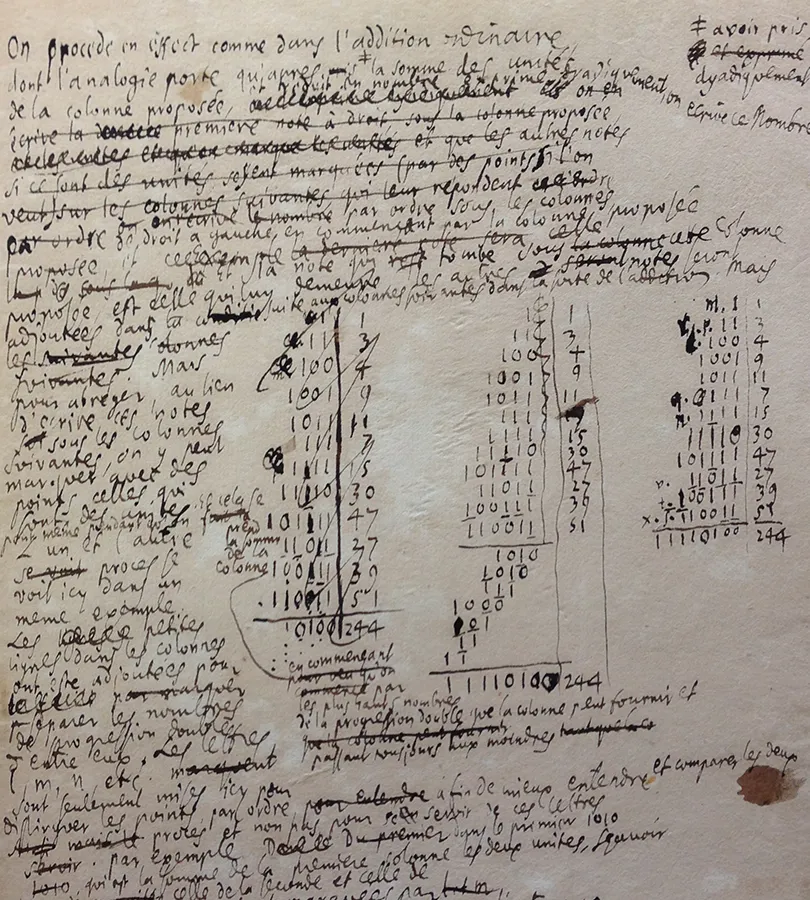
Recently some naive fool proposed removing the “2's” from our beloved Trinary Notation.
Continue reading...by Breck Yunits
I introduce the core idea of a new language for making languages.
Continue reading...June 23, 2017 — I just pushed a project I've been working on called Ohayo.
You can also view it on GitHub: https://github.com/treenotation/ohayo
I wanted to try and make a fast, visual app for doing data science. I can't quite recommend it yet, but I think it might get there. If you are interested you can try it now.
Continue reading...by Breck Yunits
Note: I renamed Tree Notation to Particles. For the latest on this, start with Scroll.
This paper presents Tree Notation, a new simple, universal syntax. Language designers can invent new programming languages, called Tree Languages, on top of Tree Notation. Tree Languages have a number of advantages over traditional programming languages.
We include a Visual Abstract to succinctly display the problem and discovery. Then we describe the problem--the BNF to abstract syntax tree (AST) parse step--and introduce the novel solution we discovered: a new family of 2D programming languages that are written directly as geometric trees.
Continue reading...June 21, 2017 — Eureka! I wanted to announce something small, but slightly novel, and potentially useful.
What did I discover? That there might be useful general purpose programming languages that don't use any visible syntax characters at all.
Continue reading...September 23, 2013 — Making websites is slow and frustrating.
Continue reading...June 2, 2013 — I have an idea for a simpler Internet, where a human could hold in their head, how it all works, all at once.
It would work much the same way as the Internet does now except for one major change. Almost all protocols and encodings such as TCP/IP, HTTP, SMTP, MIME, XML, Zone files, et cetera are replaced by a lightweight language called Scroll.
Continue reading...December 14, 2012 — Note is a structured, human readable, concise language for encoding data.
Continue reading...